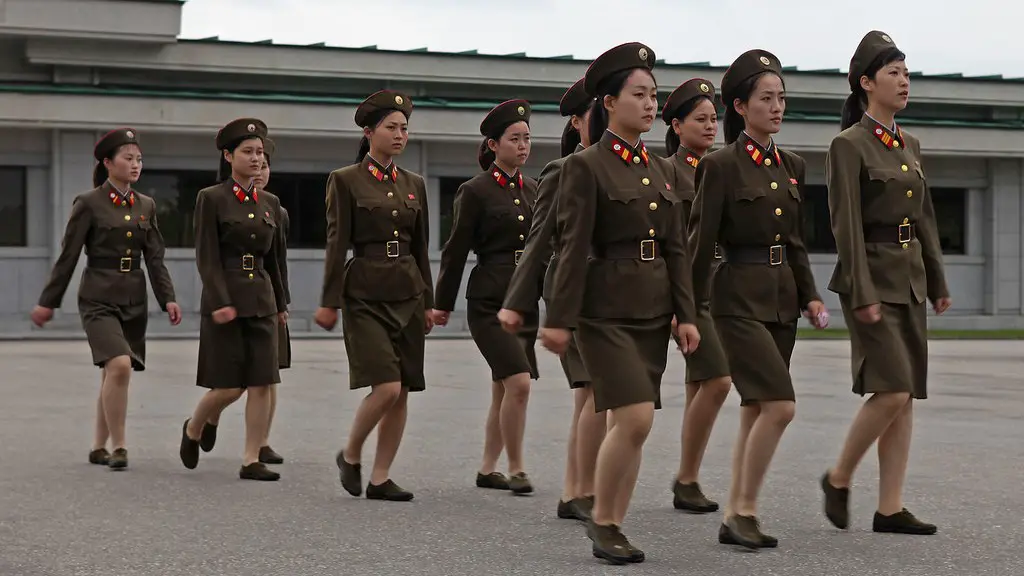Pre-Attack
In the event of a North Korean attack on Japan, there would be a period of high tensions and preparation for the conflict. A deterioration in diplomatic relations between the two countries would be likely as North Korea likely attempts some form of economic- or other-pressure on Japan in order to bend to their demands. During this period, Japan would likely increase defense spending and begin stockpiling of emergency supplies including food, water and medical supplies. The Japanese government would also mobilize its forces and increase readiness of their armed forces, likely through extensive patrols, alert levels, and exercises.
Despite the North Korean arsenal consisting of mostly short and medium range missiles, the government would also need to plan for the possibility of nuclear strikes. In response to this, the Japanese government would likely also initiate an emergency evacuation plan to ensure an orderly exit of civilian populations in the event of nuclear missile strikes.
Attack and Response
In the event of a North Korean attack, the Japanese would respond with a combination of air, land, and sea forces. Yamato-class and other Japanese naval vessels would be mobilized in the Sea of Japan, the East China Sea, and the Yellow Sea. Meanwhile, air forces of the Japan Air Self-Defense Force and the US would be placed on alert to respond to any aerial attacks or incursions by North Korean aircraft. On land, the Japan Ground Self-Defense Force would be put on alert and will likely try to counter advancing North Korean forces, while reinforced and mobilized units in certain frontline units will be moved to secure defensive positions.
Aside from the direct actions of the Japanese and American forces, the Japanese government would also attempt to shore up diplomatic and international support by invoking and most likely activating the United Nations Security Council’s Article 51, which allows a member state to defend itself from external aggression. This move could potentially attract enough support to push for economic sanctions on North Korea, as well as rally enough international forces to provide relief or other assistance.
Consequences
In terms of casualties, the outcome of a North Korean attack on Japan would no doubt be painful and far-reaching. In a worst-case scenario, a nuclear attack from North Korea on Japan could easily overwhelm Japan’s civilian-defense systems and lead to overwhelming fatalities. Even in a conventional war, the death toll could be staggering, as North Korea has a large array of short and medium-range missiles, as well as an arsenal of chemical and biological weapons.
The economic consequences would also be serious, as many businesses, particularly in Japan’s service-based economy, would be devastated. Combined with the ripple effects of a war on the already-fragile Japanese economy, any North Korean attack would lead to a widespread recession, and would also significantly hurt Japan’s standing in international markets.
From a geopolitical perspective, the consequences could be even more serious. A successful North Korean attack on Japan could possibly legitimize them as a nuclear power, while weakening the allies of both countries, such as the US and South Korea. Such a situation could potentially upset the security balance in the Asia-Pacific region and lead to further instability.
Mitigation Efforts
Given the potentially devastating consequences of a North Korea attack on Japan, both countries must engage in comprehensive and comprehensive diplomatic efforts as well as start meaningful dialogue between the two sides for any sort of peaceful resolution to the current tensions. Before any meaningful progress can be made, however, North Korea must first demonstrate that it is serious about denuclearizing, and Japan must recognize the security and economic concerns of North Korea over the imposed sanctions.
At the same time, the United States must act as an honest broker and help to facilitate talks so that both countries can reach an agreeable settlement that could lead to peaceful relations. The US has a vital role to play in ensuring that North Korea is willing to engage in serious talks, as well as in providing economic and relief assistance if a diplomatic resolution is reached.
Long-Term Solutions
In order to secure lasting peace, North Korea must be willing to accept at least some level of disarmament, particularly of its nuclear weapons. This could be achieved through the implementation of rigorous yet mutually-acceptable disarmament protocols, as well as through increased and sustained economic-development strategies aimed at alleviating the economic conditions and security concerns of North Korea. Such strategies could include various forms of direct economic assistance, as well as foster closer economic ties between the two countries.
Alongside this, the United States and other international forces should continue to provide both diplomatic and economic aid to both sides, as well as help to mediate and facilitate talks between the two countries. This should also be accompanied by other forms of diplomatic pressure, including the possible suspension or revocation of trade privileges and the imposition of further economic sanctions if necessary.
A North Korean Perspective
A North Korean attack on Japan would have far-reaching and catastrophic consequences, not only for the two respective states, but also for the region as a whole. From North Korea’s perspective, such an attack could potentially be used as a means of securing economic concessions, as well as a way to reaffirm its international standing and nuclear capabilities as a state.
However, such an action should be seen as a last resort, as any attack on Japan would risk bringing devastating consequences to the North Korean population both in terms of economic losses and casualties. Such a move could push the two countries into a military confrontation, which would no doubt be destructive and painful to both sides.
Regional Stability
For any long-term resolution, the role of regional actors such as the US, South Korea, and China should not be overlooked. All of these states are vital to the regional stability, not just in terms of diplomatic efforts in resolving the conflict, but also in providing economic assistance and security guarantees if a peaceful resolution is achieved. China, in particular, holds a great deal of financial leverage over North Korea and should use this power to ensure that any resolution should be both fair and beneficial to the region.
At the same time, both Japanese and North Korean leaders should also be mindful of the consequences of miscalculations, and strive to find a mutually-beneficial solution that can allow for the region to move forward. This could be achieved through increased regional dialogues and diplomacy, as well as by seeking economic and political concessions from the international community.
Action By Other States
Apart from the direct efforts of the two nations, other countries in the region should also act to reduce potential tensions and prevent any further escalation. South Korea, in particular, should also take an active role in resolving the conflict, as any North Korean attack on Japan could potentially lead to retaliatory counterstrikes in the Korean Peninsula. Other nations can also use their diplomatic influence to resolve the conflict by providing any necessary support or assistance to both Japan and North Korea, while also seeking to reduce the current international tensions.
At the same time, international organizations such as the United Nations and the International Atomic Energy Agency should also take steps to ensure the compliance of both countries in terms of any nuclear-arms control protocols or other disarmament measures. These organizations should also strive to ensure that any possible resolution is both sustainable and beneficial to the future stability of the Asia-Pacific region.


